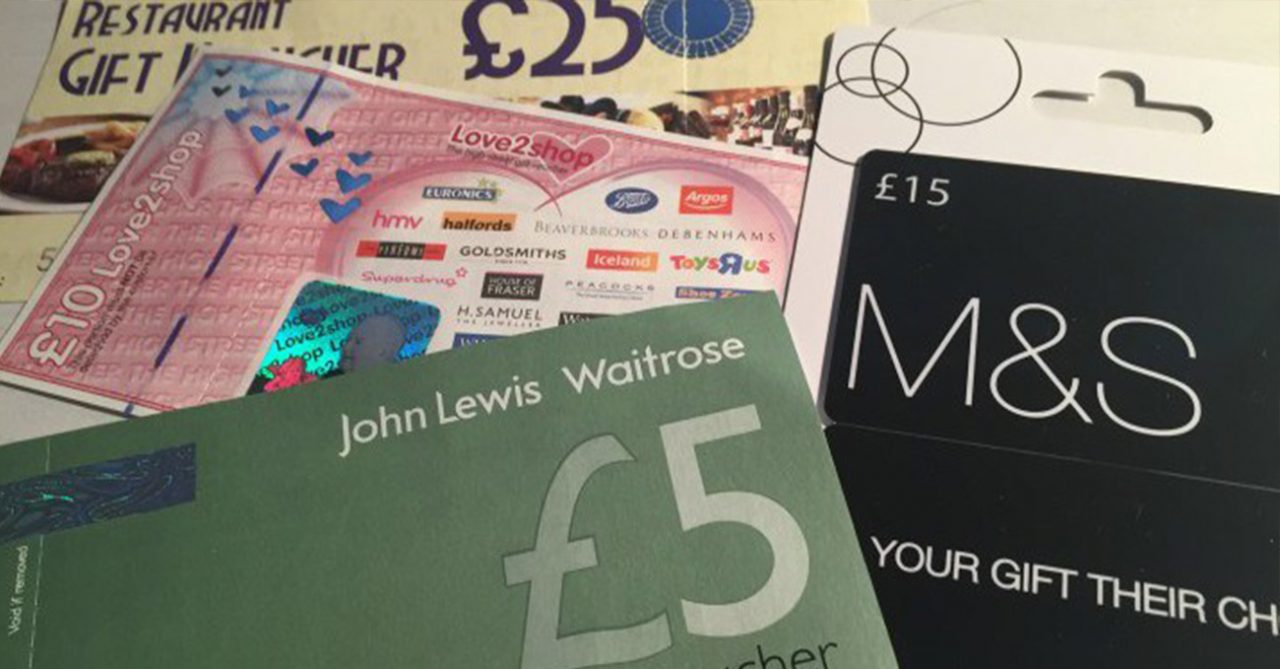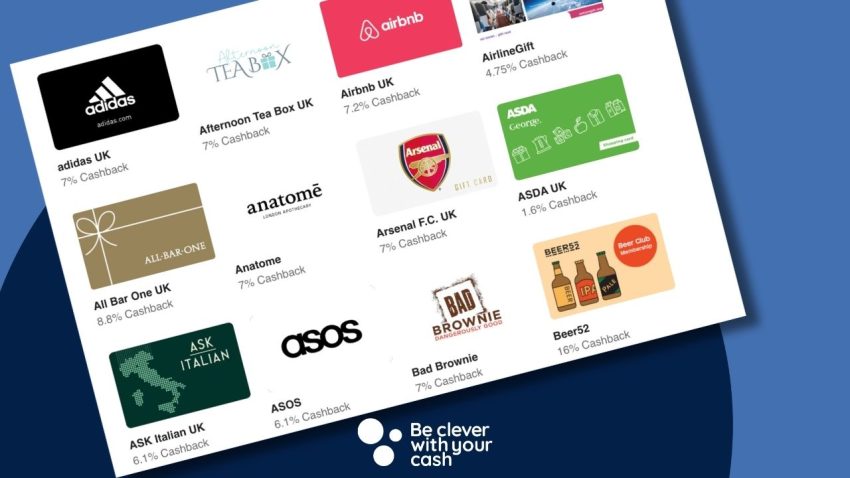Gift cards are a popular present option, but they have some major downsides.
From birthday and Christmas through to leaving and wedding gifts, at some point, we’ve all received and purchased gift cards. It makes sense – they’re an easy choice when you don’t know what to buy someone. The issue is that every time you buy a gift card you risk losing the cash on it.
The majority of the time you’ll be fine, but there are a few risks of gift cards, many of which can be reduced or avoided. Still, to be safe you need to know the good and bad of gift cards.
Some articles on the site contain affiliate links, which provide a small commission to help fund our work. However, they won’t affect the price you pay or our editorial independence. Read more here.

When gift cards are bad
I’ll lead with the dangers of gift cards – the reasons you could find your gift card is wasted cash.
Gift cards prevent you shopping around
One of the key tenets of Being Clever With Your Cash is getting the best deal. The easiest way to do this is very simple – shop around for the best price.
Yet if you have a gift card to use at Shop A, but the best price for what you want is at Shop B, you’ve no choice but to buy it from Shop A.
Ok, so it’s not the end of the world if we’re talking about a few quid, but you won’t want to miss out on larger savings.
And what if the shop you have a gift card for doesn’t have anything you want? You’ll end up using it to buy something you don’t need and probably won’t use. It’s a waste of money.
Refunds go back to a gift card
Another big risk of buying with a gift card becomes apparent if you need to return your purchase.
The money will go back to a gift card for the same shop. This is less of an issue if you shop frequently at the retailer, but what if it’s a one-off purchase?
It’s particularly bad if it’s a large purchase leaving hundreds of quid on a gift card rather than in your bank account.
This is why I never purchase discounted gift cards for anything I’m not certain about.
You also need to be careful here that you don’t chuck out your gift cards once you’ve used them. While most retailers will issue a new gift card, some will require the funds to go back to the original card.
Be aware that online purchases could also be refunded to credit that can only be used online. John Lewis is one worth highlighting here.
Say you’ve got a paper or plastic gift card you can use at both John Lewis & Waitrose shops and websites. Use it on the John Lewis website and any refunds are in credit just to use online only at John Lewis – but not Waitrose.
They often have hidden expiration dates
Most gift cards will have an expiration date. If you don’t use them before this date you lose the cash. That’s fine with paper vouchers, and most sent by email, where you can see this date in black and white.
But you need to be particularly careful with plastic gift cards. These can be loaded with different amounts at purchase, which means the details printed on them are often generic.
This makes it hard to see when the card expires, or how much is left on them. This means that a huge number will expire unused.
There are also different rules for different cards. Sometimes they’ll be valid for a set period, perhaps one or two years. Others will be valid for a certain time since they were last used. But it’s not always clear which is which.
Some, such as the One4All card will start charging you a monthly fee after a certain time (with One4All it’s 90p per month after 18 months).
The best way to prevent them from expiring (other than using them straight away) is to make a note of when you bought/received the card and its value. Then each time you use it, make a note of the date and new value, or keep your receipts with it, they typically have details of what’s left on the card.
 Featured switching deal
Featured switching deal
 Customer rating
3.8/5
Customer rating
3.8/5
- Switch bonus£200
- Offer endsUnknown
- Extra bonus£25 Amazon Gift Card
- FSCS Protected? Yes
- Switch bonus requirements Switch using the Current Account Switch Service and close your old account within 60 days of starting the switch
- Deposit requirements Deposit £1,500 in the first 60 days from opening the account
- Direct debits transferred over Set up two Direct Debits before or after the switch from a selected list of household bills
- Existing customers? Can't have held any Santander current account on 1 January 2025
- Restrictions Can't have received a switching bonus from Santander already, offer limited to once per person
- Eligible accounts Open a new or hold an existing Everyday, Edge, Edge Up or Edge Explorer current account
- £25 Amazon Gift Card requirements To qualify for the gift card, you need to complete a full switch using CASS, and make five debit card transactions within 30 days of opening the account
It can be hard to spend the full amount
Often you’ll find that if you don’t use the gift card in one go you’ll be left with a few quid, or even pennies, left over. They’re not enough to buy something outright, so you keep hold of the card until you next go to that retailer.
And then you forget. And that money sits there until the card expires. More wasted money.
There can be limits on using multiple cards
If you’re asking multiple people to give you cards to go towards a purchase, check if there’s a limit to how many cards you can use in a single transaction.
Marks & Spencer and Curry’s, for example, will only allow 10 to be used at once.
There’s no protection with a gift card
Spending with a credit or debit card can give you some advantages over gift cards. Section 75 of the Consumer Credit Act protects credit card purchases over £100, while the Chargeback scheme for credit and debit cards is a route if you’ve problems with purchases under £100.
If you pay with gift cards, or cash for that matter, you lose this protection.
And much like cash, if you lose your gift card there’s no way of getting it back. So try not to carry too many gift cards around with you.
They can be worthless if the shop goes bust
We’ve seen a succession of high street staples shut their doors over the last few years, and when this happens the administrators don’t have to honour any gift cards.
A few years ago Arcadia only allowed gift cards to be used for half the total purchase, with the rest covered by another form of payment – forcing people to spend extra money so they didn’t lose the value of the cards.
Often shops closing down just stop accepting outstanding cards. Jessops, HMV and Peacocks all made gift cards and vouchers worthless overnight when they entered administration.
It’s also unlikely that buying gift cards on a credit card and using Section 75 would help you get your money back in these situations as gift card balances are usually far less than £100.
If, despite this, you still want to give a card, it would be wise to avoid any retailer which appears to be struggling.
Get the best of our money saving content every week, straight to your inbox
Plus, new Quidco customers get a high paying £18 welcome offer

When gift cards are good
That’s one long list of negatives when it comes to gift cards… but there are a handful of times when they can be worth the risk.
When you get an extra discount
You don’t have to buy them as gifts – you can buy them for yourself for your own shopping. And that can be a good thing when you’re able to buy discounted gift cards.
It could mean you pay less for your everyday shopping, including at places where it’s hard to find offers. For instance, though small you could get 2% back at Amazon or 4% at the supermarket – better than the rate you’ll get from a cashback credit or debit card.
And since the gift cards are like cash, you can stack them with other promotions and savings, such as in tandem with Meerkat Movies at the cinema, or with BOGOF offers.
The top places to look for these are:
- Payouts from money earned on Quidco and TopCashback
- TopGiftCards (from TopCashback)
- Cashback on gift cards from JamDoughnut, Cheddar or HyperJar.
- Any “work perk” schemes you can access
- Special offers at Amazon boosting your purchases
For example, I often get an extra 6% off John Lewis gift vouchers via my Scottish Friendly ISA perks. It comes as an email but I print it out and I’m able to use it both online and in-person at the department store and in Waitrose.
Supermarkets often run promotions on selected gift cards, such as Spotify, Pizza Express, Cineworld and Footlocker. If we spot decent deals we’ll share them on our gift card deals page.
When you spend them straight away
The main way to avoid the bulk of risks outlined above is to spend your gift card as soon as you get it! That way they can’t expire, be lost or lose their value of the shop goes bust.
When you can use them on lots of things
If you’re set on buying a gift card for someone then you could look at one you can use at multiple retailers.
Though there’s always the risk that the companies selling these could go out of business themselves, you’ve got a choice where you shop. The main ones are One4All and Love2Shop.
Our podcast
Listen to Cash Chats, our award-winning podcast, presented by Editor-at-Large Andy Webb and Deputy Editor Amelia Murray.
Episodes every Thursday.

Alternatives to gift cards
Really you’re better off giving cash, sending a cheque or transferring money to a bank account. Yes these can feel lazy and seem impersonal. But really, is that very different from a gift card?
I know people worry that the money will just disappear from a bank account on everyday spending than buy something special. That certainly is a risk, but you can steer someone to use the gifted money in a certain way.
Perhaps you can say “use this for a nice meal out”. Or to “put it towards a new winter coat”. Hopefully if you suggest this you’ll get a nice text or email sharing when and where it is spent.
And don’t be put off sending a cheque (if you’re still got a chequebook). There are a number of banks now that let you pay in a cheque via the app.






I’ve signed up to our work gift card scheme to see how useful it is this year. My plan is to use them on our regular food shop for a small percentage discount for a bit of admin work.
I use an ASDA Christmas Savings card, which is a gift card, mainly for the £15 bonus every November (subject to balance). Its expiry date, shown on the receipt every time it’s used is 1/3025 – a millennium in the future.
I normally put the full required amount for maximum bonus on in the first week of November, but topping it up can also help getting rewards for debit or credit card use.
Nothing here that isn’t blindingly obvious really.
True, but as I’m sure you’re aware when it comes to financial matters the general public don’t even think about the blindingly obvious.
Thanks Alex! When it comes to gift cards we see year after year people forgetting to spend them and then losing the cash.